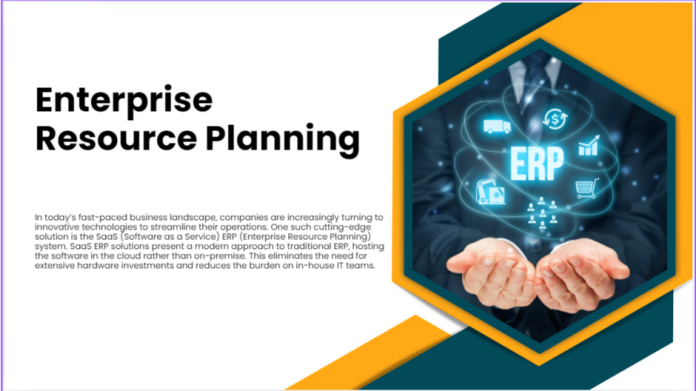In today’s fast-paced business landscape, companies are increasingly turning to innovative technologies to streamline their operations. One such cutting-edge solution is the SaaS (Software as a Service) ERP (Enterprise Resource Planning) system. SaaS ERP solutions present a modern approach to traditional ERP, hosting the software in the cloud rather than on-premise. This eliminates the need for extensive hardware investments and reduces the burden on in-house IT teams.
Scalable Solutions for Growing Businesses
- At its core, a SaaS ERP solution integrates various business processes, such as finance, human resources, sales, and supply chain management, into a single, cohesive system.
- This integration promotes real-time data sharing across departments, fostering better collaboration and decision-making.
- The beauty of SaaS ERP lies in its accessibility. All you need is an internet connection to access your ERP system from any device, anywhere in the world. This flexibility is particularly advantageous for businesses with remote or multi-location operations.
- Moreover, updates and maintenance are managed by the provider, ensuring your system is always up-to-date with the latest features and security patches.
- SaaS ERP solutions are also scalable, allowing businesses to easily adjust their subscription plans as they grow. This scalability makes SaaS ERP an attractive option for startups and expanding enterprises alike.
In summary, SaaS ERP solutions represent a powerful, cost-effective, and flexible tool for businesses aiming to optimize their operations and stay competitive in an ever-evolving market.
Key Features of SaaS ERP Solutions
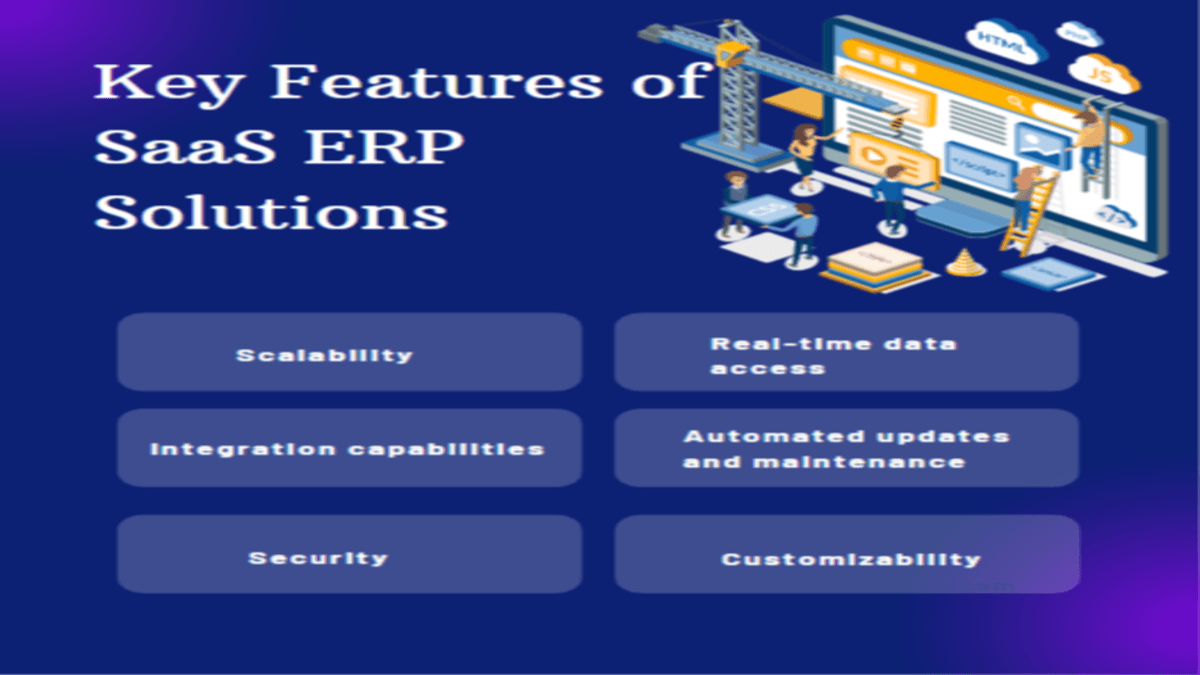
SaaS ERP (Software as a Service Enterprise Resource Planning) solutions have transformed how businesses manage their operations by providing accessible, scalable, and cost-effective ERP systems. These cloud-based solutions come packed with a multitude of features that cater to various business needs.
1.scalability:
As your business grows, the software can easily adjust to meet enhanced operational requirements without the need for significant infrastructure investments. This is ideal for startups and mid-sized businesses aiming for growth.
2. Real-time data access:
This is an another crucial feature. SaaS ERP solutions ensure that your team can access updated information from anywhere, at any time. This is particularly beneficial for businesses with remote or global operations, enabling seamless collaboration and decision-making.
3. Integration capabilities:
Modern SaaS ERP systems can effortlessly integrate with other software solutions and third-party applications, streamlining workflows. This includes accounting software, CRM systems, and even specialized industry applications.
4. Automated updates and maintenance:
With SaaS ERP, software updates and maintenance are managed by the service provider. This means your system is always up-to-date with the latest features and security patches, minimizing downtime and IT costs.
5. Security:
SaaS ERP solutions typically include advanced **security measures** such as data encryption, multi-factor authentication, and regular security audits to protect sensitive information.
6. Customizability:
Many SaaS ERP platforms offer customizable modules and dashboards, allowing businesses to tailor the software according to their unique operational needs.
By integrating these key features, SaaS ERP solutions offer a flexible, secure, and efficient way to manage business processes, making them an attractive option for companies of all sizes.
Benefits of Adopting SaaS ERP
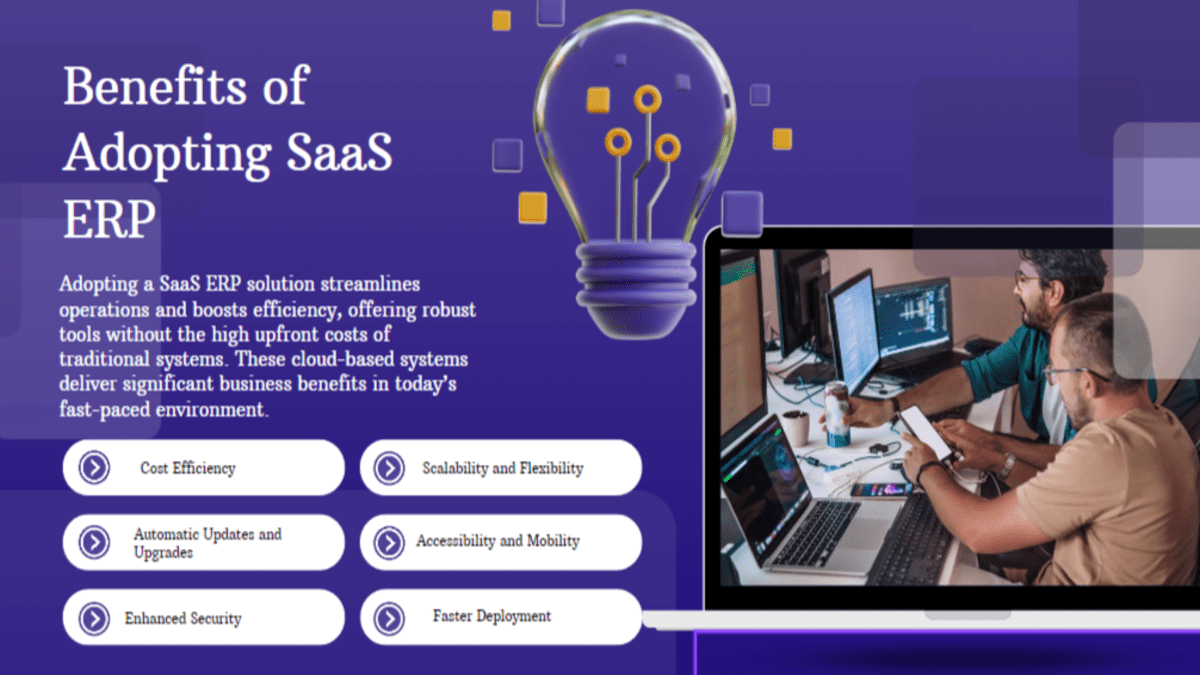
In today’s fast-paced business environment, adopting a SaaS ERP (Software as a Service Enterprise Resource Planning) solution offers multiple compelling benefits. These cloud-based systems provide organizations with robust tools to streamline operations and drive efficiency without the hefty upfront investment associated with traditional ERP systems.
1. Cost Efficiency:
One of the standout benefits of SaaS ERP is its cost-effectiveness. Businesses pay a subscription fee, typically on a monthly or annual basis. This eliminates large, initial capital expenditures and hardware investments, making comprehensive ERP solutions accessible even to smaller organizations.
2. Scalability and Flexibility:
SaaS ERPs offer unparalleled scalability. Companies can easily scale up or down depending on their current needs, without worrying about hardware constraints or extended deployment cycles. This flexibility ensures that resources are optimally utilized and can adapt to changing business environments.
3. Automatic Updates and Upgrades:
SaaS ERP providers handle updates and upgrades, ensuring that the software is always up-to-date with the latest features, security patches, and technological advancements. This reduces the burden on in-house IT teams and ensures continuous improvement without disruption to business operations.
4. Accessibility and Mobility:
SaaS ERPs are accessible from anywhere with an internet connection. This mobility empowers remote teams, supports real-time collaboration, and enhances decision-making with instant access to business data, regardless of location.
5. Enhanced Security:
Leading SaaS ERP providers invest heavily in security measures, offering high levels of data protection through encryption, regular audits, and compliance with global standards. This ensures that business data remains secure and private, reducing the risk of breaches.
6. Faster Deployment:
Implementation of SaaS ERPs is significantly faster compared to on-premise solutions. Being web-based, these systems can be deployed quickly, allowing businesses to start reaping the benefits of the system without the lengthy installation and setup periods.
In summary, SaaS ERP solutions present a compelling option for businesses seeking to optimize operations, reduce costs, and remain agile in an ever-changing market.
Implementation Strategies for SaaS ERP
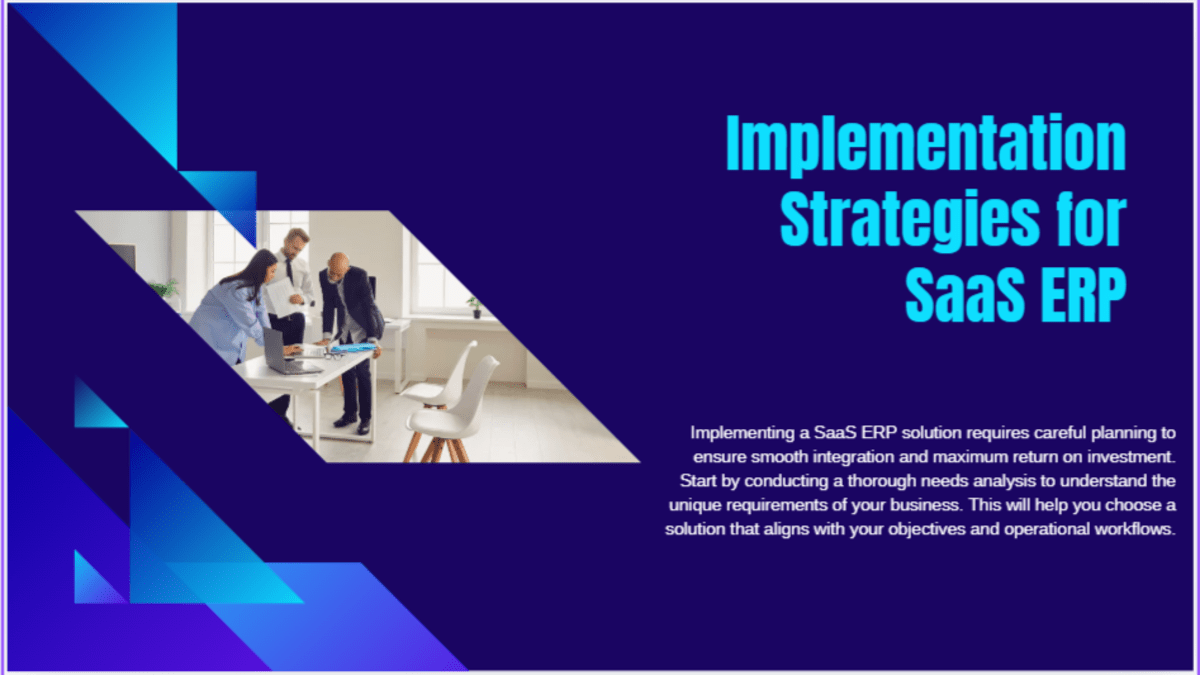
Implementing a SaaS ERP solution requires careful planning to ensure smooth integration and maximum return on investment. Start by conducting a thorough needs analysis to understand the unique requirements of your business. This will help you choose a solution that aligns with your objectives and operational workflows.
- Next, secure buy-in from key stakeholders by illustrating the long-term benefits and cost savings of SaaS ERP. Prepare a detailed project plan that includes timelines, milestones, and responsibilities. This structured approach will keep the implementation process on track and minimize disruptions.
- Data migration is a critical phase. Ensure your existing data is clean and well-organized before transfer. Work closely with the SaaS ERP vendor to handle the migration efficiently, minimizing data loss and errors. It’s also wise to have a backup plan in case issues arise during the transition.
- Employee training is another vital aspect. Conduct comprehensive training sessions to acquaint your team with the new system. Tailor the training to different user roles to ensure everyone can navigate the software seamlessly and utilize its features effectively.
- Testing is indispensable. Run pilot tests to identify any glitches or areas for improvement. This phase is crucial for catching potential problems before the full-scale rollout.
- Finally, establish ongoing support and maintenance protocols. Regularly review system performance and updates to ensure the ERP continues to meet your business needs. Engage with the vendor for continuous support and leverage new features as they become available.
By following these steps, businesses can navigate the complexities of SaaS ERP implementation and set the foundation for long-term success.
Potential Challenges and Solutions in SaaS ERP Adoption
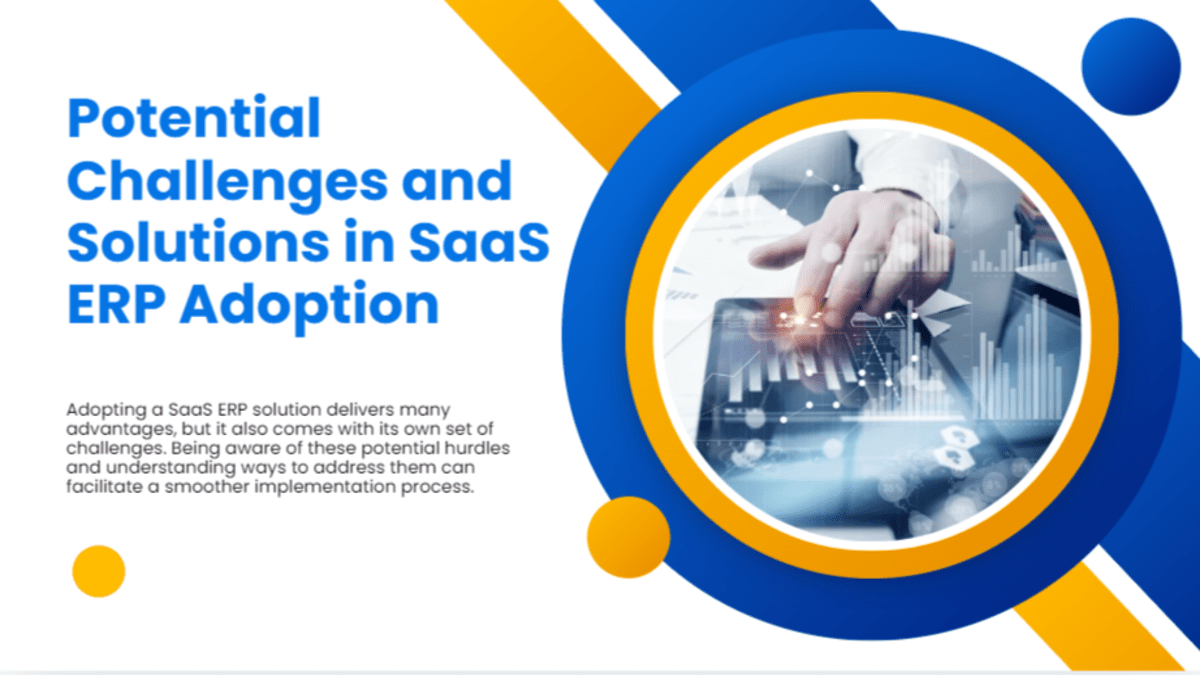
Adopting a SaaS ERP solution delivers many advantages, but it also comes with its own set of challenges. Being aware of these potential hurdles and understanding ways to address them can facilitate a smoother implementation process.
-
Data Security Concerns:
When utilizing a SaaS ERP system, your sensitive business data is stored off-site in the cloud. This often raises concerns about the data security breaches and unauthorized access. To mitigate this risk, choose a reputable SaaS vendor with robust security measures, including data encryption, multi-factor authentication, and regular security audits.
-
Customization Limitations:
SaaS ERP solutions might not offer the same level of customization as on-premise systems. This can be a problem if your business has unique requirements. To work around this, ensure the SaaS provider offers a flexible platform with configurable modules. You can also explore API integrations to extend functionalities according to your needs.
-
Dependence on Internet Connectivity:
Cloud-based ERP systems require a stable internet connection. Any disruption in connectivity can hinder access to critical business processes. To address this, invest in a reliable internet service and consider having a backup connection to minimize downtime.
-
Vendor Lock-In:
Switching vendors can be challenging in a SaaS environment due to potential data migration issues and compatibility concerns. To combat this, negotiate flexible contract terms and confirm the provider supports seamless data export and interoperability with other systems.
-
Performance and Downtime Issues:
Although SaaS vendors aim for high availability, occasional downtimes are inevitable. It’s important to have a service level agreement (SLA) that clearly defines uptime guarantees and compensations for any downtime impacting your business operations.
By proactively addressing these challenges, organizations can harness the full potential of SaaS ERP solutions while maintaining business continuity and security.
Future Trends in SaaS ERP Solutions
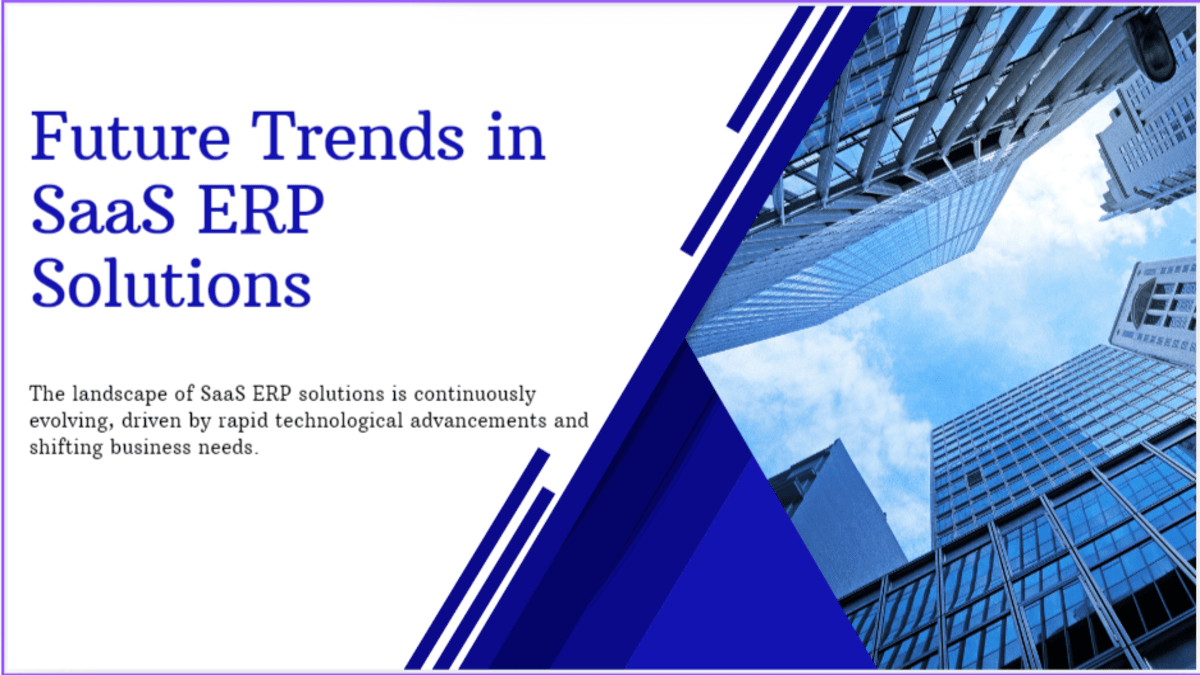
The landscape of SaaS ERP solutions is continuously evolving, driven by rapid technological advancements and shifting business needs.
-
Artificial intelligence and machine learning:
These technologies are enhancing predictive analytics, allowing businesses to make data-driven decisions with greater precision and speed. Expect AI-powered features like automated workflow optimization and intelligent forecasting to become standard in top-tier SaaS ERP products.
-
Customization and user experience:
Future SaaS ERP solutions will likely offer more flexible modules that can be easily tailored to meet the unique requirements of specific industries or businesses. The focus will be on intuitive interfaces and user-friendly dashboards to ensure that even non-technical users can navigate the system efficiently.
-
The rise of mobile ERP applications:
With more employees working remotely, there’s a growing demand for ERP systems that offer the same robust functionality on mobile devices as they do on desktops. This facilitates real-time access to crucial business data and streamlines operations, whether your team is in the office or on the go.
-
Enhanced cybersecurity:
As cyber threats become more sophisticated, SaaS ERP providers are investing heavily in advanced security measures, such as encryption and multi-factor authentication, to protect sensitive business data.
-
Sustainability:
Green computing practices and energy-efficient data centers are becoming important selling points for ERP providers. Businesses are increasingly prioritizing sustainable solutions, and ERP vendors that can offer eco-friendly options will likely gain a competitive edge.
As these trends unfold, businesses adopting SaaS ERP solutions can look forward to enhanced flexibility, security, and efficiency, positioning themselves for sustained success in an ever-competitive market.
Conclusion:
In conclusion, SaaS ERP solutions offer a powerful, flexible, and cost-effective way for businesses to streamline their operations and stay competitive. With key features such as scalability, real-time data access, and enhanced security, these cloud-based systems cater to the evolving needs of modern organizations. While challenges like customization limitations and internet dependence exist, proactive strategies can mitigate risks. As the SaaS ERP landscape continues to evolve with AI, mobile functionality, and sustainability, businesses that embrace these solutions are well-positioned for long-term growth and success.
Read More: Top 10 Popular SaaS Marketing Blogs in 2024
Related Articles:

